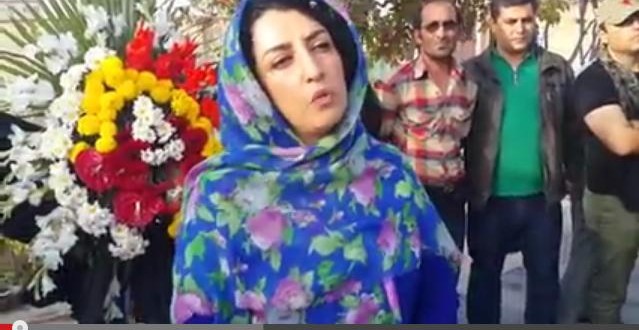Prominent Activist Charged with National Security Crimes for Her Peaceful Civic Activism
A Tehran court has charged the prominent Iranian civil rights activist and deputy head of the banned Defenders of Human Rights Center, Narges Mohammadi, with crimes against national security for her peaceful activism.
Narges Mohammadi told the International Campaign for Human Rights in Iran that Branch 15 of Tehran Revolutionary Court, under Judge Salavati, has summoned her to appear in court on May 3 “for a review of charges” leveled against her.
“I have three charges in a thick file, the entire evidence and documents for which are my activities, demands, and insistence on the realization of a civil society in Iran. Whatever activities I have had in this area has been used against me in a case,” she told the Campaign. “My case file is thick and my charges are heavy, but unfounded. I do not accept any of these charges,” she added.
“Even my presence at a gathering outside the Parliament to protest the acid attacks [against women in Isfahan], is reflected as ‘participation in riots.’ I was extensively interrogated on this subject. I said I participated in a peaceful gathering with hundreds of other citizens, but the interrogator insisted that it was a riot,” said Ms. Mohammadi.
Narges Mohammadi is faced with the charges of “propaganda against the state,” “assembly and collusion against national security,” and “establishing the anti-security and illegal ‘Step by Step to Stop Death Penalty’ group.” Step by Step to Stop Death Penalty is a campaign established by prominent Iranian civil activists that strives to abolish capital punishment in Iran.
“The reasons for these charges are almost entirely based on my civil activities over the past two years. My interviews with media based outside Iran, my speeches at different ceremonies, my efforts to abolish capital punishment through establishing ‘Step by Step to Stop Death Penalty,’ establishing ‘Women’s Civil Center,’ and continuing my activities with the Defenders of Human Rights Center, and my relationship with [human rights defender and Nobel Peace laureate] Ms. Shirin Ebadi are the most significant reasons cited for my charges,” said Narges Mohammadi.
Some of Ms. Mohammadi’s charges pertain to her meeting with the European Union foreign policy chief, Catherine Ashton, in March 2014. “In my meeting with Ms. Catherine Ashton, I listed three demands: the realization of a civil society in Iran, release of political prisoners, and an end to the state of house arrest of the Green Movement leaders [Mir Hossein Mousavi, Mehdi Karroubi, and Zahra Rahnavard]. But my demands are cited as reasons for the charges in my case. It means that my insistence and efforts for the realization of a civil society comprise the basis for my charges,” she told the Campaign.
“The Judge wrote in my case file, ‘The suspect opposes the death penalty, which is a part of Islamic laws.’ He wrote that I oppose Islamic laws. Similarly, my presence in the sit-in by the families of Kurdish Sunni prisoners which took place in front of Ghezel Hessar Prison a while back is used against me in my case. These families had gathered in front of the prison to ask for revocation of the execution orders for their children, and [the prisoners] were ultimately executed [on March 4, 2015], and I attended the sit-in along with other citizens,” Narges Mohammadi added. [Rooz Online March 9, 2015 article by Narges Mohammadi about the night she spent by Ghezel Hessar]
“Even holding a seminar about how to deal with air pollution, and a gathering to commemorate [International Women’s Day on] March 8 in 2013, is also included in my case. During the March 8 ceremonies of that year, a group of families of political prisoners were given awards by the Women’s Civil Center, and this has become a reason for my charges,” Narges Mohammadi said.
Narges Mohammadi told the Campaign that so far her lawyers have not been allowed to read her case file. “Despite repeated requests by my lawyers to Branch 15 of the Revolutionary Courts, they have not been allowed to review the case file. What I know about the evidence and documents for my three charges I have gathered during my interrogation sessions,” she said.
Immediately following her visit with Catherine Ashton in March 2014, Ms. Mohammadi was summoned to Evin Prison Courts, where she was interrogated and a judicial case against her was formed. Since then, she has received ten warnings and summonses, has been repeatedly interrogated, and on two occasions she was detained for several hours. She has also been advised twice that she is banned from foreign travel.
Narges Mohammadi was arrested in 2009 and sentenced to eleven years in prison in October 2011 on charges of “assembly and collusion against national security,” “membership in the Defenders of Human Rights Center,” and “propaganda against the state,” but her sentence was reduced to six years in prison at the appeals level. Due to severe illnesses in Zanjan Prison, she was released in 2013 on bail of 600 million toman (approximately $200,000).







